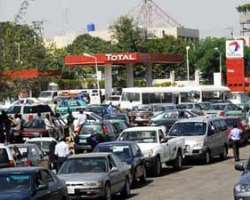NIGERIA SPENDS N201BN ON FUEL IMPORTS

LAGOS - THE Central Bank Monetary Policy Committee, yesterday, expressed concern that $1.34 billion was spent on importation of refined petroleum products between January and March 2011.
This the committee said had adverse implications both for the reserves position and government finances as a result of the huge subsidy implications.
The bank which noted that $5.145 billion was supplied to the foreign exchange market from January through March 16, 2011, said: 'There was a re-emergence of demand pressures in the foreign exchange markets during the review period.
The total supply to the Whole Dutch Auction segment by the CBN amounted to $5.145 billion from January through March 16, 2011, while demand stood at $6.815 billion during the same period. Of the amount supplied, $1.34 billion was spent on importing refined petroleum products alone, which has adverse implications both for the reserves position and government finances as a result of the huge subsidy implications'.
CBN noted: 'The WDAS segment of the foreign exchange market, however, remained relatively stable. The Naira/Dollar exchange rate opened on February 1, 2011 at N151.85/US$ and closed at N152.52/US$ on March 17, 2011, representing a slight depreciation of 0.44 per cent (or 67 kobo). However, the premium between the rates at the WDAS and other segments of the market widened towards the end of the review period, reflecting a sharper depreciation in non-WDAS segments of the foreign exchange market.
'The Committee, however, observed that given strong oil sector fundamentals, this trend is likely to be temporary.'
While urging the CBN to continue to pursue the strategy of maintaining exchange rate stability to contain inflation, it welcomed the recent build-up of foreign exchange reserves owing to increase in output and rising crude oil receipts.
Members of the committee were happy that foreign exchange reserves increased by $2.82 billion to $35.16 billion on March 16, 2011 from $32.34 billion recorded at the end of December 2010.
They noted that the solution to reserve depletion lies in the implementation of appropriate reforms with regard to industrial and trade policies aimed at reducing import_dependency.
CBN said the MPC noted 'the positive growth outlook in the near to medium term but expressed serious concern over the heightened risk of inflation following from the proposed high expenditure outlay of the Federal Government as contained in the 2011 Appropriation Bill recently passed by the National Assembly, especially in the wake of rising global food and energy prices.
It said: 'In this regard, the Committee recalled that in the past few MPC meetings, it had stressed the need for fiscal retrenchment and drawn attention to the unsustainability of the rising trend of domestic debt.
The proposed expenditure outlay negates the initial sentiment for fiscal retrenchment which would have supported monetary policy effectiveness. The current fiscal stance is inconsistent with the objective of maintaining stability in exchange rates, prices and interest rates.
The Committee, therefore, believes that unless the fiscal stance is reversed, the economy would have to bear a high cost in terms of pressure on foreign reserves, high interest rates and/or higher level of inflation.'
According to the CBN 'In the light of the foregoing analysis, Members of the Committee voted unanimously for further tightening of monetary policy because of heightened risk of inflation.
The members specifically pointed out the rising international food and energy prices, the impact of import costs on domestic prices, the challenges that fiscal stance posed to the external value of the Naira and the likely front-loading of public expenditure in the election period.'
